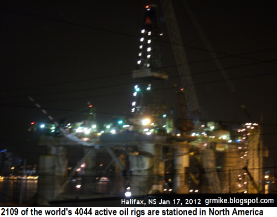There has been a lot of ongoing debate surrounding the Keystone Pipeline and just how much of an impact it will have on the price of gas. Opponents of the project claim that all of the refined oil will go overseas and along with it, any benefits for the average American. I disagree; Lower refinery utilization rates lead to higher gas prices. Though some of it may be headed overseas, fluctuations in export demand and price means that at least some of the oil will inevitably end up in US inventories.
research and analysis by SERAPHIM BLENTZAS dalhousie university
Crude oil inventory is an important statistic to consider; Higher inventories are usually associated with stable prices. Also, through policy making, the government can influence just how much of the refined product gets exported; Also through laws regarding speculation (if funds/refineries/others think the price of oil will go up, they buy a lot of it on the open market today and that pushes prices higher). In March 2012 the US exported 3.2M bpd of oil products, at the same time gasoline inventories fell to a low of 139.5M barrels, 10.1% lower than the previous year even though crude oil inventories were stable (US government needs to encourage domestic sale of gas products over the exporting of it and that shouldn't be difficult given that associated shipping costs would be avoided in the case of domestic use).
There a number of ways in which Texas stands to benefit from the pipeline. One benefit that gets overlooks is that it gives the US more control over North America's oil supply. That is one of the reasons oil titan Arthur Irving was so supportive of Canada's newest pipeline, the Energy East Pipeline. It will turn the province of NB into a major oil and gas export hub. Any oil not used locally will be loaded onto tankers and transported to destinations as far away as India.
According to the US State Department, during construction 42,000 jobs will be created. Keystone will be the safest pipeline ever built in North America ! The company's #1 priority is to build a pipeline that prevents leaks, additionally monitoring of it will involve i) acoustic sensors capable of detecting even a pin sized hole ii) helicopters equipped with infrared equipment.
Myth 1: Canadian oil companies only want to export the gas and other products created by the refining process.
The truth is, they just want their product to be more widely available and that includes individual US states. Right now, 55% of Canadian oil heads to an area known as PADD II where refinery utilization rates are much higher than the US average, and where there exists a glut of Canadian supply (in turn depressing the price of Western Canadian Select oil). Areas of refining are divided into 7 PADD districts, 3 in the east/atlantic region and 4 in the rest of the United States. Canadian oil companies simply want their oil to have more widespread use in Canada and the US. A glut of Canadian supply in one region is good for the US in the sense that it depresses the price of Canadian oil/WCS however, for many key areas in the US that's a non-factor since they can't even access it.
Summary: The 700,000 bpd Keystone Pipeline XL will reduce US gas prices due to higher refinery utilization rates, more widespread availability of cheaper WCS oil sands oil, improved energy security and the positive intangible effects on the stock market through investor confidence (understanding that US oil supplies can be maintained by a growing source in Western Canada).
Looking to the future: Mexico has under 15 years of oil reserves left and the country remains an important source of US imports. Imports from Canada were up +8.9% between November and December, even though total US imports from all countries declined.

Canadian oil producers actually had to use the Panama Canal to get their oil to Montreal ! That's unacceptable, pipeline infrastructure is obviously the problem and so I think Keystone is something that has to be built.
Canadian oil companies are even looking for customers in Eastern Canada, in a move that TransCanada says could stabilize oil prices in the country, "Even though we have a huge reservoir of oil of our own, we're still importing more than half a million more barrels a day of foreign oil, which are coming in at a much higher price today than the oil that's being extracted from the oilsands in Alberta". Some politicians are also calling it good for energy security.
Do not take for granted the fact that Keystone will give the US first dibbs on Canadian oil. If it heads overseas first, US oil and gas inventories will never even get the chance to use it.